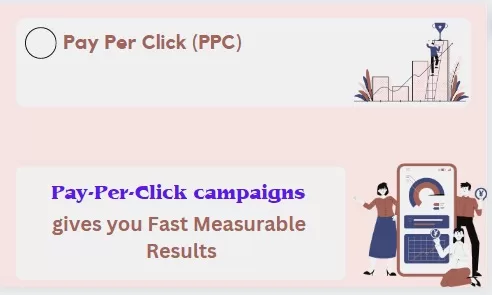
Pay-per-click (PPC) marketing has developed into a crucial tool for companies looking to boost their online presence and attract niche audiences to their websites. PPC campaigns may help businesses increase their return on investment (ROI) and significantly expand their digital marketing efforts. In this post, we’ll examine the best methods for using PPC advertising to raise ROI and make sure every click is worthwhile.
1. Conduct Thorough Keyword Research
An essential first step in every pay-per-click (PPC) advertising strategy is thorough keyword research. It offers the groundwork for identifying the proper target market and increasing the return on investment (ROI) of your PPC campaigns.
Set Campaign Objectives: Establish your campaign’s goals out front. Do you want to raise website traffic, brand exposure, or conversion rates? Knowing your objectives will enable you to choose the most pertinent keywords to target.
List Relevant Keywords: Start by coming up with a list of keywords that are pertinent to your company, its goods, or its services. Consider the keywords your target market would use to find products or services like yours.
2. Craft Compelling Ad Copy
For your target audience to pay attention to and click on your PPC advertising, you must first create an interesting ad copy.
Understand Your Audience: To begin, take the time to fully comprehend who your target market is. Determine their needs, aspirations, and driving forces. Make sure the text in your advertisements speaks to their wants and requirements. To make your advertisements more effective, speak their language and solve their unique problems.
Unique selling points (USPs) to emphasize and Clearly express the differentiating qualities of your goods or services that make them stand out from the competition. What distinguishes or makes your offering unique? In order to attract attention and persuade visitors to click on your advertisement, highlight important features, advantages, or assurances.
3. Leverage Ad Extensions
Ad extensions are useful tools that help increase your PPC advertising’ exposure and potency. They provide users with more information and chances to interact with your adverts.
Sitelink Extensions: Sitelink extensions let you add more links inside your advertisement to particular web pages on your website. Use site links to lead visitors to landing pages, product categories, or particular campaigns that are pertinent and have a high conversion rate. To promote clicks, make sure the site links are appealing and informative.
Callout Extensions: Callout extensions provide you the chance to draw attention to important features, special selling points, or deals associated with your goods or services. Use this plugin to highlight your company’s unique selling points, such as free delivery, round-the-clock customer service, price matching, and other features.
4. Optimize Landing Pages
Increasing the efficacy of your pay-per-click (PPC) advertising campaigns requires optimizing your landing pages. The conversion of ad clicks into useful activities, like sales, sign-ups, or inquiries, depends heavily on landing pages.
Keep Your Relevance High: Make sure your landing page is really pertinent to the advertisement that people clicked on. Users gain trust and feel more assured that they are in the correct place when there is consistency in language and design between the advertisement and landing page. To provide a smooth user experience, the headline, keywords, and overall messaging should all match.
A crisp and captivating title that highlights the value proposition or offer from your PPC ad will quickly grab the attention of website visitors.
5. Implement Conversion Tracking
Conversion monitoring must be put into place in order to evaluate the effectiveness of your pay-per-click (PPC) advertising campaigns and comprehend how your adverts affect targeted actions or conversions.
You may measure and optimize for activities that are significant to your company goals by setting defined conversion targets.
Utilize conversion tracking tools: Most PPC advertising systems, including Google Ads, include these features by default. By adding a tracking code or pixel to the appropriate pages of your website, you may set up conversion tracking inside the platform.

6. Continuously Monitor and Optimize
For your pay-per-click (PPC) advertising efforts to be successful and effective, ongoing monitoring and optimization are crucial. You may maximize your return on investment (ROI) and get better outcomes by periodically analyzing and improving your efforts.
Monitor Key Performance Metrics: Keep an eye on key performance indicators to gauge how well your efforts are doing. The return on ad spend (ROAS), average order value, click-through rates (CTR), conversion rates, cost per conversion, and overall campaign ROI are some examples of key indicators. Utilize these indicators to pinpoint potential areas for development and monitor your campaign’s success.
Regularly analyze your keywords’ performance by doing analyses of them. Find keywords that convert well and have a good return on investment.
7. Consider Remarketing
Remarketing, sometimes referred to as retargeting, is a potent tactic that may help your pay-per-click (PPC) advertising campaigns perform at their peak potential. You may use it to find individuals who have already visited your website or engaged with your brand and communicate with them. You may raise brand recognition, promote conversions, and improve campaign success by getting in touch with these people.
Set Up Remarketing Lists: To start, make remarketing lists to target and segment particular user groups. You may make lists of customers who visited particular product pages, added goods to their carts but abandoned their shopping carts, or subscribed to your email. By segmenting your audience, you may create a message that is more individualized and focused.
Conclusion
In conclusion, by adhering to a set of best practices, businesses may maximize their return on investment (ROI) using pay-per-click (PPC) advertising. Businesses may improve user engagement, boost conversions, and accomplish their marketing objectives by implementing these practices in their PPC campaigns. Businesses should be aware of current market trends, test and refine their strategy, and use data-driven insights to guide decision-making.